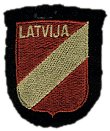“Deluded” LatviansIt's farcical to even contend a “Latvia” exists
So, what does Hale think of Latvians' defense of their homeland? Apparently that Latvians suffer from mass delusion that Latvia should even exist as a nation-state.
Before 1920, Latvia and Estonia had never existed as sovereign nations. When Latvians proclaimed independence in 1918, 1they had to set out their borders using the thirteenth-century defensive frontier drawn up by the Teutonic Knights as a bulwark against Russian incursion. 2Since the idea that Latvia was a nation state at all was a figment of deluded Latvian imaginations, the German occupiers assumed that it would evaporate along with its name. A German official put a mollifying gloss on this 3scam: ‘the times of political independence are in the past ... they have been exchanged for times of peace and prosperity under the protection of the German Reich.’ 4Ignorant of the long-term German master plan, many Latvians continued to bask in the glow of deliverance from Soviet tyranny – and there would be no shortage of eager collaborators.
Hale portrays Latvia's borders as some bogus construct drawn from medieval history. Latvia's borders closely flow those of the Baltic provinces, which in turn, followed closely the extent of Latvian ethnic settlement for millennia—long before the German crusaders arrived and set up defenses along the historical boundary of Latvian settlement against the Russian horde. Hale picks a 13th century manifestation—effect—of 4,000 years of historical Latvian habitation and substitutes it for the cause to contend it was the only way Latvians even knew how to pick a border.
Imagine the uproar which would erupt if just two words in that sentence were changed: "Since the idea that Israel was a nation state at all was a figment of deluded Jewish imaginations,..."
The very notion of a homeland is a Latvian "scam." Hale inarguably sums up his gross prejudice in a single word.
Hale would have us believe Latvians were too ignorant to figure out borders and had to resort to 13th century historical artefacts, too ignorant to understand they don't deserve their own country, too ignorant to understand when others are trying to take away the country they don't deserve in the first place.... As for basking in the glow of Nazi-delivered liberation and rushing to join the Nazi family, from the February, 1944 Statement by the Latvian Underground Central Council:
In burning indignation the Latvian people denounce the reprisals which the German occupying power is taking in Latvia. 5,000 Latvian citizens are languishing in concentration camps and prisons to which they have been sent without court or trial. German police officials apply torture as a method of examination. About 10,000 Latvians have been shot during the two dire years of German occupation and there is no end yet to the executions. Wholesale murders of Latvian citizens of Jewish race have also taken place. In September 1943 the German occupation authorities evicted more than 10,000 farmers in the Dundaga region in Northern Kurzeme. The persons concerned were robbed of all they had: land, houses and movable property. In the same month the Germans deported to Germany several thousands of people from Latgale, as politically unreliable. The Germans did not pay any attention to family ties—children were separated from their parents and wives from their husbands.
Latvians were also fully aware of, and expected to ultimately subvert, Hitler's plan for them and their homeland.
It's unclear whether Hale continues along "the Germans had it all along, there's no such thing as Latvia" line or insinuates that Germans are so comfortable in Rīga because it's a Nazi family affair:
It is 6especially telling that Minister Rosenberg 5regarded Riga as a ‘German city’ and appointed his father-in-law, Hugo Wittrock, a Baltic German, to serve as its mayor.
Interwar Rīga was a cosmopolitan city. Its past mayors even included a Rīga-born Briton, George Armistead, whose hunting manor today is a popular tourist attraction. Street signs were trilingual: Russian, German, and Latvian, as were educated Latvians.
So, what is the true historical context for Rīga's German-ness? UNESCO has recognized it as a World Heritage Site for its collection of Jugendstil German Art Deco architecture. Hale mistakes the bricks of a city—the inheritance of seven centuries of Baltic German hegemony—for the hearts of its people.
6“especially telling that Minister Rosenberg 5regarded Riga as a ‘German city’ and appointed his father-in-law, Hugo Wittrock, a Baltic German, to serve as its mayor”
"Telling" of what, exactly? That the Baltic Germans were all Nazis? Or that Rīga was Nord-Naziburg? Wittrock was viciously anti-Latvian1, there was certainly no implication of Latvian=German camaraderie in his installation by the occupying authorities. Nor did "German" imply anti-Semitic. Baltic Germans with family ties to Germany also included Paul Schiemann, a pioneer in human rights, posthumously recognized as Righteous Among the Nations.
Latvia survived half a century of crushing Soviet occupation. Its era of post-Soviet freedom has eclipsed its first period of independence between WWI and WWII. These speak to the tenacity of the Latvian people, not to delusional dreams of self-determination.
| 1 | Dallin, A. German Rule in Russia, 1941-1945: A Study of Occupational Policies, page 190. |
